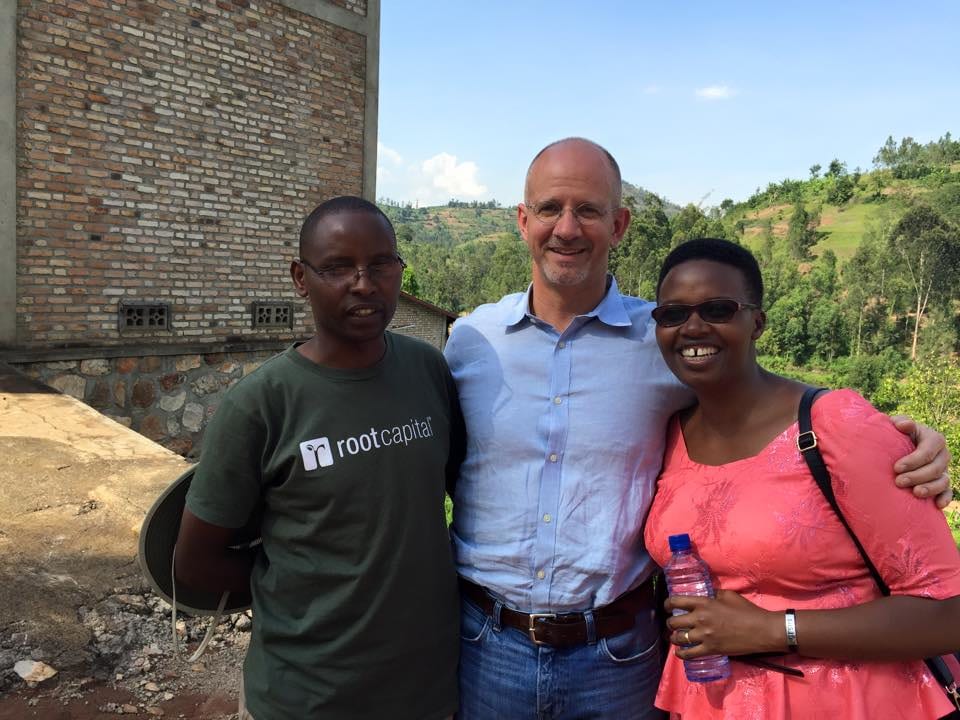Professional cuppers assess coffee quality at Rwashoscco. Credit: Root Capital
Following the tragedy of Genocide against Tutsi of 1994, Rwanda’s once-vibrant coffee industry was nearly destroyed. Although coffee farms remained in the landscape, generations of coffee-growing knowledge had been stripped away. Revitalizing the industry became a priority for the country’s recovery.
In partnership with the U.S. and Rwandan governments, specialists came to Rwanda in the early 2000s to support farmers and processors in all aspects of the specialty coffee value chain. The result was a new generation of Rwandan coffee leaders.
Angelique Karekezi was one of the early participants in the USAID-funded PEARL & SPREAD project. Today, she is not only the Managing Director of the Rwanda Smallholder Specialty Coffee Company (Rwashoscco)–a business that represents six coffee cooperatives–but a global star of the Rwandan coffee movement.
The Challenge
“Following the tragedy of 1994, on the path to recovery, we worked hard to improve our farmers’ lives,” says Angelique, “It was a very challenging time.”
In the early 2000s, the focus was on developing specialty coffee so farming communities could earn more for their crops. She explains, “We had to convince farmers to harvest their [coffee] cherries and deliver them to coffee washing stations. We would work day and night to help farmers understand what we were hoping to do for the coffee sector. We had to improve the quality of the coffee and build skills to create a high-quality coffee.”
On top of this, she says, “The value chain was difficult, understanding the international market was difficult, and gaining finance partners was difficult. It was all a hard moment.”
During this period, Angelique and the cohort of young Rwandans developed the necessary knowledge to become agents of change. Their commitment, vision, and success fueled the recovery of Rwanda’s coffee sector and supported livelihoods for thousands of coffee communities across the country. “Our coffee is one of the main parts of our economy,” says Angelique.

Women, like Angelique, have played an important role in Rwanda’s recovery from conflict (left to right: Theophile Biziyaremye, General Manager of Maraba – a cooperative that is part of Rwashoscco, Root Capital Founder and CEO Willy Foote, Angelique Karekezi) Credit: Root Capital
Our Collaboration
Following Angelique’s involvement in PEARL & SPREAD, she joined Rwashoscco, a smallholder coffee company 100% owned by its six shareholders (five cooperatives and one family company). She has been its Managing Director since 2014.
As producers, marketers, roasters, and exporters of Rwanda’s specialty coffee, Rwashoscco supports the full spectrum to add value to coffee. “We are a direct link between farmers and the market,” says Angelique. “We bridge our producers and others with the market to help them improve their lives and businesses.”
Angelique and the Rwashoscco team have built and maintained a reputation as a “go-to source” for some of Rwanda’s finest coffees, helping to establish multi-year relationships with the coffee cooperatives they represent and coffee buyers who are eager to establish direct linkages to producers. Over the past 20 years, Root Capital has been a partner with Rwashoscco. We have provided lending and/or technical training to all six cooperatives within Rwashoscco, many of whom are current clients.
“Root Capital linked us to new markets,” says Angelique. “And because we were working with Root Capital, we had the trust of our buyers…they knew we could access finance.”
The Impact
Years of dedication, strategic vision, and a global approach have brought significant benefits to Rwanda’s farmers and the nation as a whole.
Angelique is a firm believer in the power that access to markets can bring to the coffee growers. For example, she developed “Angelique’s Finest”–a Fairtrade certified coffee brand produced entirely by women. The coffee is being sold in Europe with great success.
“With Angelique’s Finest, we are giving back to the women’s associations we are working with,” she says. “A percentage of money they receive is supporting community activities.”
As the Rwashoscco cooperatives grow, they invest in community initiatives. “Different cooperatives help communities access electricity and improve infrastructure, such as bridges and roads,” she says.
Angelique and others are also involved in a movement to build a local culture of coffee consumption. Historically, the beverage has not been consumed by Rwandans; the highest-quality beans were always exported. Today, coffee shops and cafes abound in Rwanda’s capital Kigali, and in other cities and towns, rivaling those in more established markets. Angelique says, “We want to reduce the difference between import and export to create a local economy and pride around it.”
“Coffee is a good image of our country and shows our reputation,” says Angelique. “The community in the coffee business who visit are spending money here… so our coffee is connected to tourism.”
Rebuilding the coffee sector in Rwanda has been a decades-long success story in the making. “Now we have many and different players in the sector,” says Angelique. “We have many connections around the world, and we participate in many coffee communities.” Although there are always challenges still to face, “We know better how to manage them and to use our different connections and innovations,” she says. The future is bright.
